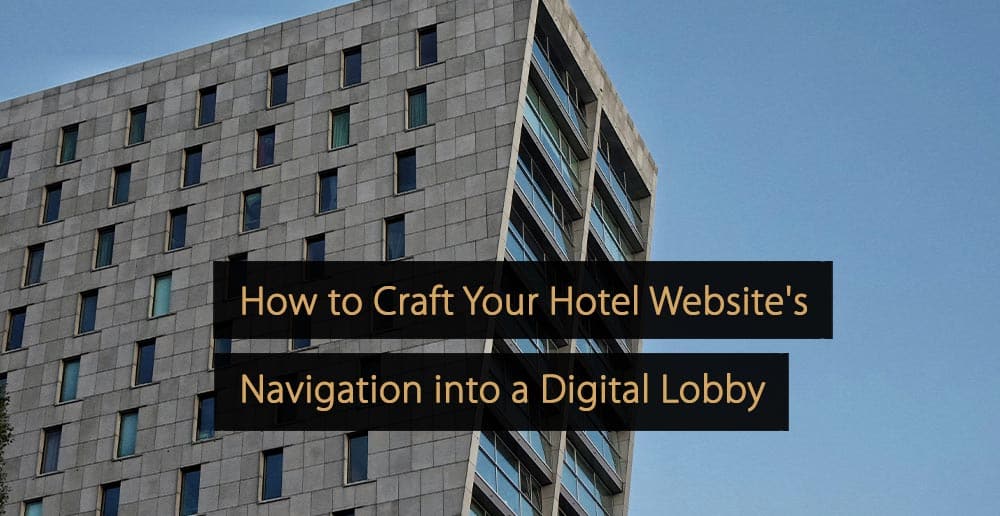It should come as no surprise that your hotel’s website, in fact, serves as a virtual lobby for your business. The question is—are you treating it as such?
The Importance of Your Digital Lobby
In a similar way to how your property’s lobby sets the tone for a new guest’s stay, your website will set the expectations for any potential guests who land on it. Here, they get a sneak peek into your brand, your property, and everything else you have to offer. This can make or break their decision of whether or not to book with you, and, believe it or not, that decision often happens within minutes.
Unlike your physical lobby, however, understanding how guests interact with this digital space of yours requires a bit more investigation. Fortunately for you, we’ve already gone ahead and done the research. By analyzing which of your pages visitors are searching for and crafting an informed strategy on where to place them, your team can significantly enhance the overall user experience and, more importantly, drive faster bookings.
Website Navigation Myths
Myth 1: All High-Traffic Pages Should be Included in your Main Navigation
Some of your website’s pages may attract significant traffic from search engines, but that doesn’t necessarily mean they deserve prime placement in your main menu. For example, your “Blog” page might draw a lot of visitors from search engines, but only a small fraction of visitors will actually click on it from the navigation menu. So, while your blog is clearly valuable, it doesn’t need to be included in the main navigation.
Pro Tip: Focus your website’s navigation on pages that directly contribute to bookings or guest inquiries. Utilize analytics tools to identify what your essential pages are versus those that can be easily found via search engines or internal links.
Myth 2: Guests Will Click on Every Page in the Navigation
If your navigation includes page titles with vague or unclear purposes, guests are less likely to explore, no matter how prominently displayed they might be. Pages like “Discover” or “Sustainability” can receive minimal clicks despite their position in the main navigation. If the title doesn’t explicitly tell a visitor what they are getting out of visiting that page, they won’t bother clicking.
Pro Tip: Simplify your navigation to make it more intuitive. Don’t be afraid to use clear, action-oriented labels in your navigation to guide guests effortlessly through your site. Instead of using words like”Discover,” try actionable phrases like “Explore [City]” or “Nearby Attractions”.
Your Website’s Key Pages and Their Optimal Placement
1. The Homepage: Your Digital Welcome Mat
Your website’s homepage receives the most virtual foot-traffic from visitors compared to your other pages combined. Like a front desk agent, ready to greet and guide incoming guests with a smile, your homepage should be able to immediately provide the most crucial information upfront and be ready to direct visitors to where they would like to go. At a minimum, it should provide a comprehensive overview of your hotel, with clear pathways to booking and key information. At best, it should feature show-stopping imagery, share a compelling story, and ultimately make website visitors want to stay at your property.
Pro Tip: Your logo’s placement should always be on the top left of the screen and link back to the homepage, so guests can easily return to their starting point.
2. Special Offers and Events: Your Revenue-Driving Pages
Any and all pages that drive direct revenue to your business should be displayed front and center. For many luxury hotels, “Packages” pages have been proven to be an impactful revenue driver. But if it’s not prominently featured in the main navigation, visitors won’t know about it. The same applies to timely offers, like events. To avoid wasting time in building a great page that no one will see, add these timely and exclusive deals to your website’s main navigation.
Pro Tip: Use actionable and direct language when adding these titles to your navigation and don’t forget to include clear Calls-to-Action on each page – the goal is conversion, after all.
3. Rooms and Suites: Your Chance to Showcase
Potential guests will naturally want to know what a stay would look like if they choose your hotel, so it’s important that your “Rooms and Suites” landing page is included in your main navigation. Just like your homepage, this page calls for stunning imagery and detailed descriptions to highlight your accommodations.
Pro Tip: In addition to beautiful imagery, adding videos or virtual tours of your rooms to provide a more immersive experience can potentially increase the time spent on your page by 10 times.
4. Dining and Amenities: Your Valuable Add-ons
Pages with titles similar to “Dine and Drink” are popular, often ranking just below the homepage in terms of traffic. Dining options and amenities are valuable elements that can significantly enhance the guest experience and drive bookings. Don’t forget to spotlight standout amenities that set your property apart, such as spa services, fitness centers, and recreational areas. At times, these value-adds can even be the one thing that helps a potential guest decide to convert. Make sure these pages are easy to find in the navigation to entice guests with your dining and leisure options.
Pro Tip: Save flowery language for print material and make sure to use language that is clear, concise, and helps visitors imagine what their experience might be like if they booked at your hotel.
5. Contact Information: Your Direct Line
As they visit your website, potential guests may have questions or need assistance, which only your team can address. Having an accessible “Contact” page is crucial in facilitating a direct line of communication with visitors. This page should be ridiculously easy to find, either in the main navigation or as a sticky element that follows guests as they scroll.
Pro Tip: For stronger accessibility, include multiple contact options, such as phone, email, and live chat. Additionally, make sure that your contact information remains consistent across your online presence to optimize your website for local SEO rankings.
Optimizing for Visitors on Mobile Devices
Mobile browsing is quickly becoming the norm when it comes to website visits and travel booking. This means it’s vital for your business to prioritize mobile optimization. Keep in mind that mobile website visits are generally shorter and have fewer page views per session, meaning you have much less time to engage the visitor. Create a solid foundation for your mobile strategy by streamlining your landing page for quick, seamless access to key information and feature an easy-to-find and navigate burger menu.
Pro Tip: Use responsive designs that will automatically adapt to any visitor’s device and optimize all of your images and scripts to ensure your site loads quickly.
Conclusion: Curating a Digital Lobby That Converts
Transforming your hotel’s website into an effective digital lobby means understanding what potential guests want and need. Understanding how visitors navigate your website is crucial for optimizing user experience and driving bookings. Analyze traffic patterns, test new layouts, and refine your digital presence to ensure your virtual doors are always open and inviting for your ideal guest.
By focusing on more strategic navigation, crystal-clear labeling, and optimizing for a mobile-first experience, you can create a digital experience that informs, inspires, and converts. Don’t forget: your website is often the first impression a potential guest has of your property. Make it count by delivering a user experience that, just like your physical lobby, is impressive and welcoming.
More Tips to Grow Your Business
Revfine.com is the leading knowledge platform for the hospitality and travel industry. Professionals use our insights, strategies, and actionable tips to get inspired, optimize revenue, innovate processes, and improve customer experience.Explore expert advice on management, marketing, revenue management, operations, software, and technology in our dedicated Hotel, Hospitality, and Travel & Tourism categories.








Leave A Comment